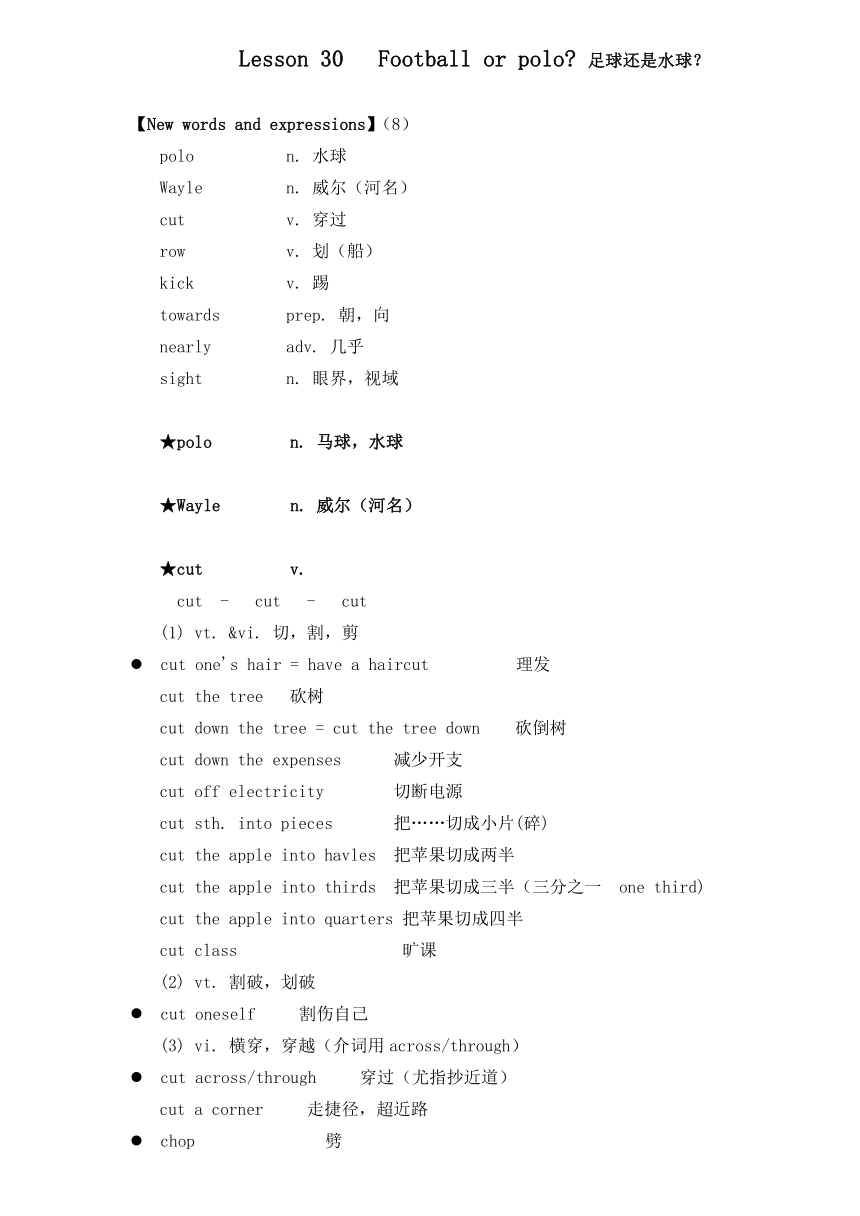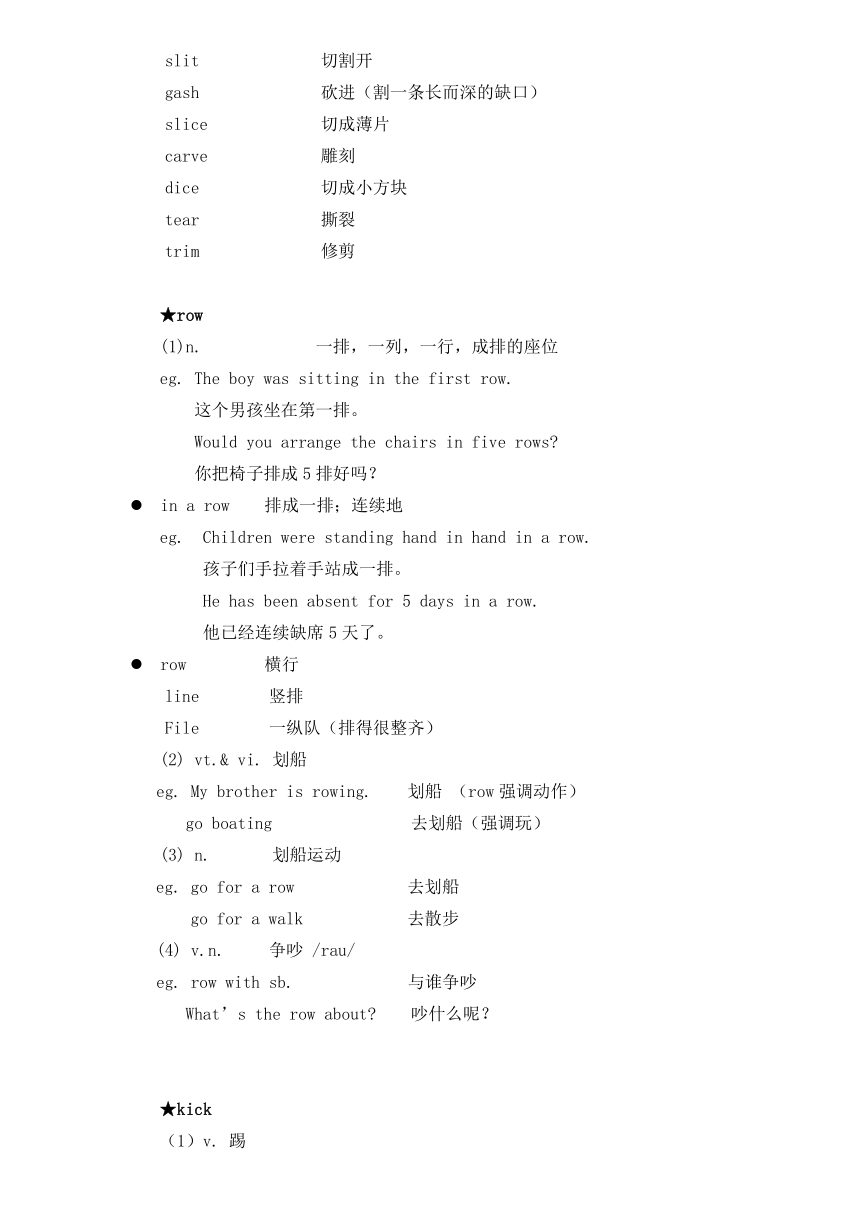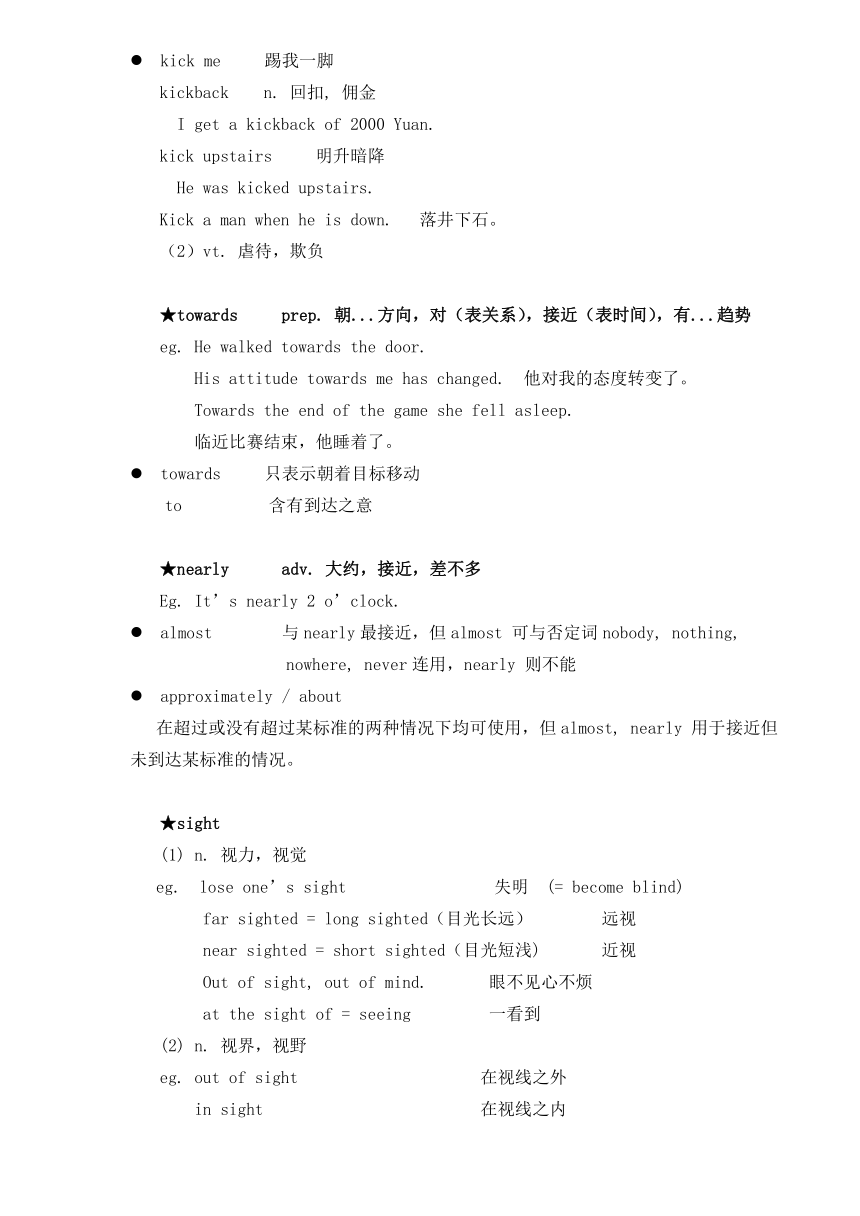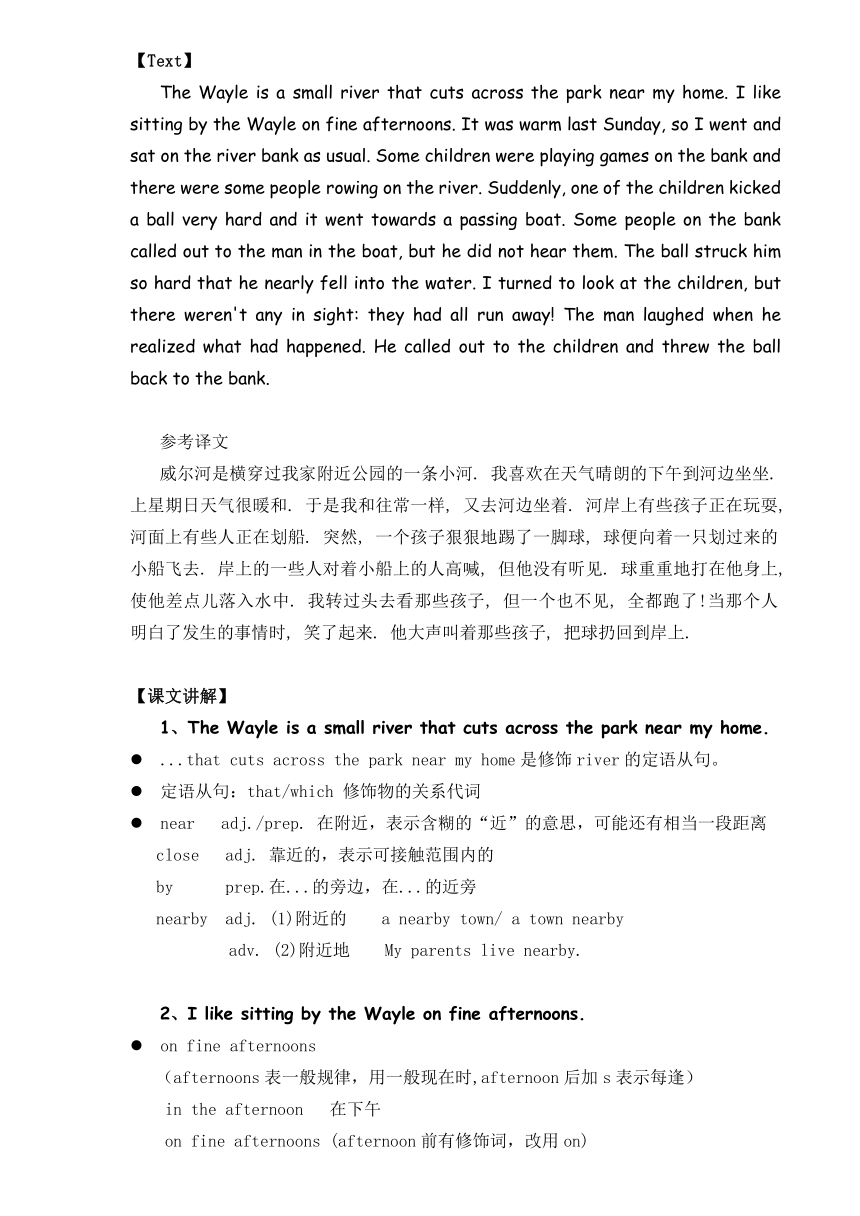新概念英语第二册 Lesson 30 Football or polo 足球还是水球?笔记
文档属性
| 名称 | 新概念英语第二册 Lesson 30 Football or polo 足球还是水球?笔记 |  | |
| 格式 | docx | ||
| 文件大小 | 27.1KB | ||
| 资源类型 | 教案 | ||
| 版本资源 | 新概念英语 | ||
| 科目 | 英语 | ||
| 更新时间 | 2023-09-26 06:29:19 | ||
图片预览




文档简介
Lesson 30 Football or polo 足球还是水球?
【New words and expressions】(8)
polo n. 水球
Wayle n. 威尔(河名)
cut v. 穿过
row v. 划(船)
kick v. 踢
towards prep. 朝,向
nearly adv. 几乎
sight n. 眼界,视域
★polo n. 马球,水球
★Wayle n. 威尔(河名)
★cut v.
cut - cut - cut
(1) vt. &vi. 切,割,剪
cut one's hair = have a haircut 理发
cut the tree 砍树
cut down the tree = cut the tree down 砍倒树
cut down the expenses 减少开支
cut off electricity 切断电源
cut sth. into pieces 把……切成小片(碎)
cut the apple into havles 把苹果切成两半
cut the apple into thirds 把苹果切成三半(三分之一 one third)
cut the apple into quarters 把苹果切成四半
cut class 旷课
(2) vt. 割破,划破
cut oneself 割伤自己
(3) vi. 横穿,穿越(介词用across/through)
cut across/through 穿过(尤指抄近道)
cut a corner 走捷径,超近路
chop 劈
slit 切割开
gash 砍进(割一条长而深的缺口)
slice 切成薄片
carve 雕刻
dice 切成小方块
tear 撕裂
trim 修剪
★row
(1)n. 一排,一列,一行,成排的座位
eg. The boy was sitting in the first row.
这个男孩坐在第一排。
Would you arrange the chairs in five rows
你把椅子排成5排好吗?
in a row 排成一排;连续地
eg. Children were standing hand in hand in a row.
孩子们手拉着手站成一排。
He has been absent for 5 days in a row.
他已经连续缺席5天了。
row 横行
line 竖排
File 一纵队(排得很整齐)
(2) vt.& vi. 划船
eg. My brother is rowing. 划船 (row强调动作)
go boating 去划船(强调玩)
n. 划船运动
eg. go for a row 去划船
go for a walk 去散步
(4) v.n. 争吵 /rau/
eg. row with sb. 与谁争吵
What’s the row about 吵什么呢?
★kick
v. 踢
kick me 踢我一脚
kickback n. 回扣, 佣金
I get a kickback of 2000 Yuan.
kick upstairs 明升暗降
He was kicked upstairs.
Kick a man when he is down. 落井下石。
(2)vt. 虐待,欺负
★towards prep. 朝...方向,对(表关系),接近(表时间),有...趋势
eg. He walked towards the door.
His attitude towards me has changed. 他对我的态度转变了。
Towards the end of the game she fell asleep.
临近比赛结束,他睡着了。
towards 只表示朝着目标移动
to 含有到达之意
★nearly adv. 大约,接近,差不多
Eg. It’s nearly 2 o’clock.
almost 与nearly最接近,但almost 可与否定词nobody, nothing,
nowhere, never连用,nearly 则不能
approximately / about
在超过或没有超过某标准的两种情况下均可使用,但almost, nearly 用于接近但未到达某标准的情况。
★sight
n. 视力,视觉
eg. lose one’s sight 失明 (= become blind)
far sighted = long sighted(目光长远) 远视
near sighted = short sighted(目光短浅) 近视
Out of sight, out of mind. 眼不见心不烦
at the sight of = seeing 一看到
n. 视界,视野
eg. out of sight 在视线之外
in sight 在视线之内
【Text】
The Wayle is a small river that cuts across the park near my home. I like sitting by the Wayle on fine afternoons. It was warm last Sunday, so I went and sat on the river bank as usual. Some children were playing games on the bank and there were some people rowing on the river. Suddenly, one of the children kicked a ball very hard and it went towards a passing boat. Some people on the bank called out to the man in the boat, but he did not hear them. The ball struck him so hard that he nearly fell into the water. I turned to look at the children, but there weren't any in sight: they had all run away! The man laughed when he realized what had happened. He called out to the children and threw the ball back to the bank.
参考译文
威尔河是横穿过我家附近公园的一条小河. 我喜欢在天气晴朗的下午到河边坐坐. 上星期日天气很暖和. 于是我和往常一样, 又去河边坐着. 河岸上有些孩子正在玩耍, 河面上有些人正在划船. 突然, 一个孩子狠狠地踢了一脚球, 球便向着一只划过来的小船飞去. 岸上的一些人对着小船上的人高喊, 但他没有听见. 球重重地打在他身上, 使他差点儿落入水中. 我转过头去看那些孩子, 但一个也不见, 全都跑了!当那个人明白了发生的事情时, 笑了起来. 他大声叫着那些孩子, 把球扔回到岸上.
【课文讲解】
The Wayle is a small river that cuts across the park near my home.
...that cuts across the park near my home是修饰river的定语从句。
定语从句:that/which 修饰物的关系代词
near adj./prep. 在附近,表示含糊的“近”的意思,可能还有相当一段距离
close adj. 靠近的,表示可接触范围内的
by prep.在...的旁边,在...的近旁
nearby adj. (1)附近的 a nearby town/ a town nearby
adv. (2)附近地 My parents live nearby.
2、I like sitting by the Wayle on fine afternoons.
on fine afternoons
(afternoons表一般规律,用一般现在时,afternoon后加s表示每逢)
in the afternoon 在下午
on fine afternoons (afternoon前有修饰词,改用on)
on the afternoon of July the fourth
like to do sth. 喜欢……(一次性的)
I like to drink tea.
like doing sth. 喜欢……(习惯性的)
I like drinking water.
It was warm last Sunday, so I went and sat on the river bank as usual.
as usual 和往常一样
than usual 比平常
as before 像以前
than before 比以前
Some children were playing games on the bank and there were some people rowing on the river.
用过去进行时描述故事的背景
rowing现在分词表伴随状语
Suddenly, one of the children kicked a ball very hard and it went towards a passing boat.
a passing boat 正在经过的船只(现在分词作定语)
Some people on the bank called out to the man in the boat, but he did not hear them.
on the bank 在岸上的(介词短语修饰people)
in the boat 在船上的(介词短语修饰man)
call out to sb. (for sth.) 大声呼叫(以引起别人注意)
7、The ball struck him so hard that he nearly fell into the water.
strike v.罢工,重重一击 (strike struck struck)
so…that… 如此……以致于…… (that 引导的结果状语从句)
so + adj./adv. + that
The teacher speaks so fast that I can't catch the word.
My brother walks so slowly that he can't catch up with me. (赶不上)
The English is so easy that I can learn it well.
so的后面跟副词或形容词, 如后跟名词时要用such +n. +that…
8、I turned to look at the children, but there weren't any in sight: they had all run away!
in sight 看得见,在视野之内(反义词为out of sight)
9、The man laughed when he realized what had happened.
when引导时间状语从句
eg. When you are in trouble, visit this man.
I was cooking dinner when they came home.
laugh 大声地笑,出声地笑
smile 微笑
grin 露齿而笑
chuckle 低声轻笑
sneer 嘲笑
giggle 咯咯地笑
happen 表偶然事件发生(无被动语态)
He called out to the children and threw the ball back to the bank.
call out to sb. 对...大声喊叫
【Key structures】
Some and Any
二者都表示不定量的代词,相当于“一些”,可修饰可数名词复数和不可数名词,some多用于肯定句,any多用于疑问句,否定句或条件从句。
eg. There are some scenic spots around the city.
They haven’t put forward any concrete proposals. (明确的建议)
If you find any new words in it, mark them out.(作出标记来)
有些疑问句表示请求、建议、反问等,这时多用some而不用any。
eg. Would you mind buying me some aspirin
Aren’t there some stamps in that drawer
some 和any 还可用来修饰可数名词单数,这时some 表示“某一个”,any 表示“任何一个”、“随便哪一个”。
eg. You will regret it some day. 你总有一天会后悔的。
You can get it in any department store. 随便在哪家商店你都能买到。
冠词the的用法
(1)在人名和地名前不加冠词a或the
(2)在海洋、河流、山脉前,一定要用定冠词the
(3)由普通名词构成的专有名词前加the
America - the United States of America
China - the People’s Republic of China
the Great Wall 长城
the Summer Palace 颐和园
the Forbidden City 紫禁城
表特定的或上文提到过的事物(或双方都明了的事物)前加the
世界上独一无二的事物前加the
the earth, the moon, the sun
(6) 在序数词或形容词的最高级前加the
the second storey(楼层), the largest room
(7)表方位的名词前加the
on the left, on the right, in the east, in the west
(8)表时间的一些固定短语前加the
in the morning in the afternoon in the day time(在白天)
the用在形容词前表一类人
the poor, the rich, the old, the young, the sick ,the new(新来的)
the blind
(10) 用在姓氏复数形式前,表一家人或夫妇俩
the Sawyers 索耶一家,索耶夫妇
(11)在乐器前加the
the piano, the violin, the saxophone
(12) 表世纪的某个年代
in the 1980’s
(13) 发明物前加the
The telephone was invented by Bell.
The compass(指南针)was invented in China.
不加冠词的时候
专有名词、物质名词、抽象名词、人名、地名前不加冠词。
China London America Smith Art matter
季节、月份、星期、节假日,一日三餐前不加冠词。
March May National’s day Children’s day
supper Spring Saturday
(3) 学科名称、球类、棋类名词前不加冠词。
maths politics football basketball chess
【New words and expressions】(8)
polo n. 水球
Wayle n. 威尔(河名)
cut v. 穿过
row v. 划(船)
kick v. 踢
towards prep. 朝,向
nearly adv. 几乎
sight n. 眼界,视域
★polo n. 马球,水球
★Wayle n. 威尔(河名)
★cut v.
cut - cut - cut
(1) vt. &vi. 切,割,剪
cut one's hair = have a haircut 理发
cut the tree 砍树
cut down the tree = cut the tree down 砍倒树
cut down the expenses 减少开支
cut off electricity 切断电源
cut sth. into pieces 把……切成小片(碎)
cut the apple into havles 把苹果切成两半
cut the apple into thirds 把苹果切成三半(三分之一 one third)
cut the apple into quarters 把苹果切成四半
cut class 旷课
(2) vt. 割破,划破
cut oneself 割伤自己
(3) vi. 横穿,穿越(介词用across/through)
cut across/through 穿过(尤指抄近道)
cut a corner 走捷径,超近路
chop 劈
slit 切割开
gash 砍进(割一条长而深的缺口)
slice 切成薄片
carve 雕刻
dice 切成小方块
tear 撕裂
trim 修剪
★row
(1)n. 一排,一列,一行,成排的座位
eg. The boy was sitting in the first row.
这个男孩坐在第一排。
Would you arrange the chairs in five rows
你把椅子排成5排好吗?
in a row 排成一排;连续地
eg. Children were standing hand in hand in a row.
孩子们手拉着手站成一排。
He has been absent for 5 days in a row.
他已经连续缺席5天了。
row 横行
line 竖排
File 一纵队(排得很整齐)
(2) vt.& vi. 划船
eg. My brother is rowing. 划船 (row强调动作)
go boating 去划船(强调玩)
n. 划船运动
eg. go for a row 去划船
go for a walk 去散步
(4) v.n. 争吵 /rau/
eg. row with sb. 与谁争吵
What’s the row about 吵什么呢?
★kick
v. 踢
kick me 踢我一脚
kickback n. 回扣, 佣金
I get a kickback of 2000 Yuan.
kick upstairs 明升暗降
He was kicked upstairs.
Kick a man when he is down. 落井下石。
(2)vt. 虐待,欺负
★towards prep. 朝...方向,对(表关系),接近(表时间),有...趋势
eg. He walked towards the door.
His attitude towards me has changed. 他对我的态度转变了。
Towards the end of the game she fell asleep.
临近比赛结束,他睡着了。
towards 只表示朝着目标移动
to 含有到达之意
★nearly adv. 大约,接近,差不多
Eg. It’s nearly 2 o’clock.
almost 与nearly最接近,但almost 可与否定词nobody, nothing,
nowhere, never连用,nearly 则不能
approximately / about
在超过或没有超过某标准的两种情况下均可使用,但almost, nearly 用于接近但未到达某标准的情况。
★sight
n. 视力,视觉
eg. lose one’s sight 失明 (= become blind)
far sighted = long sighted(目光长远) 远视
near sighted = short sighted(目光短浅) 近视
Out of sight, out of mind. 眼不见心不烦
at the sight of = seeing 一看到
n. 视界,视野
eg. out of sight 在视线之外
in sight 在视线之内
【Text】
The Wayle is a small river that cuts across the park near my home. I like sitting by the Wayle on fine afternoons. It was warm last Sunday, so I went and sat on the river bank as usual. Some children were playing games on the bank and there were some people rowing on the river. Suddenly, one of the children kicked a ball very hard and it went towards a passing boat. Some people on the bank called out to the man in the boat, but he did not hear them. The ball struck him so hard that he nearly fell into the water. I turned to look at the children, but there weren't any in sight: they had all run away! The man laughed when he realized what had happened. He called out to the children and threw the ball back to the bank.
参考译文
威尔河是横穿过我家附近公园的一条小河. 我喜欢在天气晴朗的下午到河边坐坐. 上星期日天气很暖和. 于是我和往常一样, 又去河边坐着. 河岸上有些孩子正在玩耍, 河面上有些人正在划船. 突然, 一个孩子狠狠地踢了一脚球, 球便向着一只划过来的小船飞去. 岸上的一些人对着小船上的人高喊, 但他没有听见. 球重重地打在他身上, 使他差点儿落入水中. 我转过头去看那些孩子, 但一个也不见, 全都跑了!当那个人明白了发生的事情时, 笑了起来. 他大声叫着那些孩子, 把球扔回到岸上.
【课文讲解】
The Wayle is a small river that cuts across the park near my home.
...that cuts across the park near my home是修饰river的定语从句。
定语从句:that/which 修饰物的关系代词
near adj./prep. 在附近,表示含糊的“近”的意思,可能还有相当一段距离
close adj. 靠近的,表示可接触范围内的
by prep.在...的旁边,在...的近旁
nearby adj. (1)附近的 a nearby town/ a town nearby
adv. (2)附近地 My parents live nearby.
2、I like sitting by the Wayle on fine afternoons.
on fine afternoons
(afternoons表一般规律,用一般现在时,afternoon后加s表示每逢)
in the afternoon 在下午
on fine afternoons (afternoon前有修饰词,改用on)
on the afternoon of July the fourth
like to do sth. 喜欢……(一次性的)
I like to drink tea.
like doing sth. 喜欢……(习惯性的)
I like drinking water.
It was warm last Sunday, so I went and sat on the river bank as usual.
as usual 和往常一样
than usual 比平常
as before 像以前
than before 比以前
Some children were playing games on the bank and there were some people rowing on the river.
用过去进行时描述故事的背景
rowing现在分词表伴随状语
Suddenly, one of the children kicked a ball very hard and it went towards a passing boat.
a passing boat 正在经过的船只(现在分词作定语)
Some people on the bank called out to the man in the boat, but he did not hear them.
on the bank 在岸上的(介词短语修饰people)
in the boat 在船上的(介词短语修饰man)
call out to sb. (for sth.) 大声呼叫(以引起别人注意)
7、The ball struck him so hard that he nearly fell into the water.
strike v.罢工,重重一击 (strike struck struck)
so…that… 如此……以致于…… (that 引导的结果状语从句)
so + adj./adv. + that
The teacher speaks so fast that I can't catch the word.
My brother walks so slowly that he can't catch up with me. (赶不上)
The English is so easy that I can learn it well.
so的后面跟副词或形容词, 如后跟名词时要用such +n. +that…
8、I turned to look at the children, but there weren't any in sight: they had all run away!
in sight 看得见,在视野之内(反义词为out of sight)
9、The man laughed when he realized what had happened.
when引导时间状语从句
eg. When you are in trouble, visit this man.
I was cooking dinner when they came home.
laugh 大声地笑,出声地笑
smile 微笑
grin 露齿而笑
chuckle 低声轻笑
sneer 嘲笑
giggle 咯咯地笑
happen 表偶然事件发生(无被动语态)
He called out to the children and threw the ball back to the bank.
call out to sb. 对...大声喊叫
【Key structures】
Some and Any
二者都表示不定量的代词,相当于“一些”,可修饰可数名词复数和不可数名词,some多用于肯定句,any多用于疑问句,否定句或条件从句。
eg. There are some scenic spots around the city.
They haven’t put forward any concrete proposals. (明确的建议)
If you find any new words in it, mark them out.(作出标记来)
有些疑问句表示请求、建议、反问等,这时多用some而不用any。
eg. Would you mind buying me some aspirin
Aren’t there some stamps in that drawer
some 和any 还可用来修饰可数名词单数,这时some 表示“某一个”,any 表示“任何一个”、“随便哪一个”。
eg. You will regret it some day. 你总有一天会后悔的。
You can get it in any department store. 随便在哪家商店你都能买到。
冠词the的用法
(1)在人名和地名前不加冠词a或the
(2)在海洋、河流、山脉前,一定要用定冠词the
(3)由普通名词构成的专有名词前加the
America - the United States of America
China - the People’s Republic of China
the Great Wall 长城
the Summer Palace 颐和园
the Forbidden City 紫禁城
表特定的或上文提到过的事物(或双方都明了的事物)前加the
世界上独一无二的事物前加the
the earth, the moon, the sun
(6) 在序数词或形容词的最高级前加the
the second storey(楼层), the largest room
(7)表方位的名词前加the
on the left, on the right, in the east, in the west
(8)表时间的一些固定短语前加the
in the morning in the afternoon in the day time(在白天)
the用在形容词前表一类人
the poor, the rich, the old, the young, the sick ,the new(新来的)
the blind
(10) 用在姓氏复数形式前,表一家人或夫妇俩
the Sawyers 索耶一家,索耶夫妇
(11)在乐器前加the
the piano, the violin, the saxophone
(12) 表世纪的某个年代
in the 1980’s
(13) 发明物前加the
The telephone was invented by Bell.
The compass(指南针)was invented in China.
不加冠词的时候
专有名词、物质名词、抽象名词、人名、地名前不加冠词。
China London America Smith Art matter
季节、月份、星期、节假日,一日三餐前不加冠词。
March May National’s day Children’s day
supper Spring Saturday
(3) 学科名称、球类、棋类名词前不加冠词。
maths politics football basketball chess
同课章节目录
